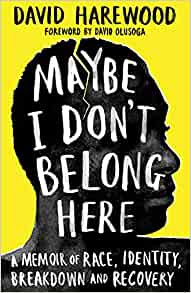Actor David Harewood pulls no punches in his autobiography in which he shares the formative events of his life that led to psychotic episodes after becoming an actor, and which ultimately led to him being sectioned twice. Harewood writes in such a friendly, conversational style that is so easy to read that it makes his harrowing depiction of the psychotic episodes that much more effecting. He is completely open about his breakdown and hopes that the book will encourage others, especially Black people, to overcome the stigma of mental health and seek help.
He vividly describes his early childhood and an early life-changing experience of racist abuse in which his psyche is “split” into two separate personas, English and Black. This is juxtaposed with scenes of a warm and loving family life, his love of the TV comedians of the time and the rarity of seeing a black actor on television at the time. This is something I remember myself from growing up, and he paints a very familiar picture of late ‘60s, early ‘70s Britain. Soon David finds himself assimilating into the “white space”. His happy school life, in which he evolved to be the class clown, changes when his father is sectioned following a breakdown. Harewood sees similarities in the drastic changes both he and his father had to undergo through living in England and admits “the white space had taken its toll on both of us”. His parents later divorce also causes the young David a great deal of pain and confusion.
We share his initial euphoria at becoming an actor which soon ends in a haze of alcohol and drug use due to psychological pressure from another actor. The title of the book is a phrase that Harewood keeps saying to himself as he struggles with his identity and feels rejected even by the “Black space” - “maybe I don’t belong here”.
It is around this time in his life when, David admits, his mind begins to unravel. He vividly describes his manic episodes where he would take walks late at night, wavering between periods of lucidity and psychosis, and often wake up the next morning in completely unfamiliar surroundings. The most extreme psychotic event results in him being arrested after believing the voice of Martin Luther King was in his head, directing him, and ends with David being sectioned twice and admitted to a psychiatric hospital. The chapter on this, entitled “The Ward”, is heartbreaking, and on the (probably unwise) advice of his brother he decides to “act normal” to get out of the hospital. Eventually, through sheer resilience, he is able to restart his acting career and to finally find inner peace while playing parts all over the world, which would ultimately lead to him starring in the show “Homeland”. He admits that his illness has given him a resilience to survive in the acting business and that it possibly shook “some of the bullshit” out of him.
The book also touches on Harewood’s shock at discovering the disproportionate amount of black people in the mental health system in the UK. A 2019/2020 survey discovered that “Black and minority people suffer elevated rates of psychosis and schizophrenia compared with white people”. This leads to Harewood making his acclaimed BBC documentary, “Psychosis and Me”, in which he finally learns the real truth about how ill he had been during his breakdown and the production is a profoundly moving experience for him.
This is a raw and honest book about being Black, (Harewood capitalises the word throughout) and about what it means to be Black with mental health problems. The book is refreshingly free of “luvviness”; Harewood necessarily mentions the famous actors he has worked with, but he never loses his starstruck amazement at meeting people like Al Pacino. He bemoans the greater opportunities for Black actors in the USA compared to the UK; pointing this out once got him into a bit of trouble. David Harewood’s book is heartbreaking yet hopeful, and I read it in one sitting.

No comments:
Post a Comment